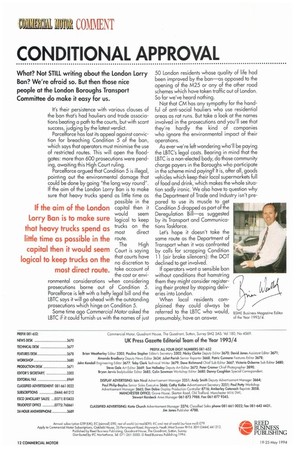CONDITIONAL APPROVAL
Page 14

If you've noticed an error in this article please click here to report it so we can fix it.
What? Not STILL writing about the London Lorry Ban? We're afraid so. But then those nice people at the London Boroughs Transport Committee do make it easy for us.
It's their persistence with various clauses of the ban that's had hauliers and trade associations beating a path to the courts, but with scant success, judging by the latest verdict. Parcelforce has lost its appeal against conviction for breaching Condition 5 of the ban, which says that operators must minimise the use of restricted routes. This will open the floodgates: more than 600 prosecutions were pending, awaiting this High Court ruling.
Parcelforce argued that Condition 5 is illegal, pointing out the environmental damage that could be done by going "the long way round". If the aim of the London Lorry Ban is to make sure that heavy trucks spend as little time as possible in the capital then it would seem logical to keep trucks on the most direct route.
The High Court is saying that courts have no discretion to take account of the cost or envi ronmental considerations when considering prosecutions borne out of Condition 5. Parcelforce is left with a hefty legal bill and the LBTC says it will go ahead with the outstanding prosecutions which hinge on Condition 5.
Some time ago Commercial Motor asked the LBTC if it could furnish us with the names of just 50 London residents whose quality of life had been improved by the ban—as opposed to the opening of the M25 or any of the other road schemes which have taken traffic out of London. So far we've heard nothing. Not that CM has any sympathy for the handful of anti-social hauliers who use residential areas as rat runs. But take a look at the names involved in the prosecutions and you'll see that they're hardly the kind of companies who ignore the environmental impact of their operations. As ever we're left wondering who'll be paying the LBTC's legal costs. Bearing in mind that the LBTC is a non-elected body, do those community charge payers in the Boroughs who participate in the scheme mind paying? It is, after all, goods vehicles which keep their local supermarkets full of food and drink, which makes the whole situation sadly ironic. We also have to question why the Department of Trade and industry isn't prepared to use its muscle to get Condition 5 dropped as part of the Deregulation Bill—as suggested by its Transport and Communications Taskforce.
Let's hope it doesn't take the same route as the Department of Transport when it was confronted by calls for scrapping Condition 11 (air brake silencers): the DOT declined to get involved. If operators want a sensible ban without conditions that hamstring them they might consider registering their protest by stopping deliveries into London.
When local residents complained they could always be referred to the LBTC who would, presumably, have an answer.
































































































